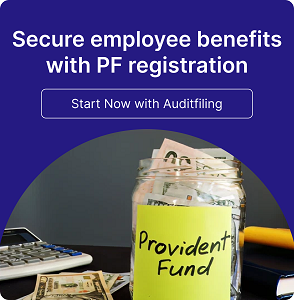
PF Registration is the process of registering your business under the Employees’ Provident Fund Organization (EPFO). It is mandatory for establishments with 20 or more employees and optional for smaller companies. Once registered, both employer and employees contribute a portion of the salary to the Provident Fund, ensuring long-term retirement savings and social security.
PF registration not only ensures legal compliance but also provides financial protection for your employees, making your business more trustworthy and employee-friendly.
PF registration is essential for both employers and employees:
Legal Compliance: Mandatory under the Employees’ Provident Funds and Miscellaneous Provisions Act, 1952, for businesses with 20+ employees. Avoid penalties and legal issues.
Retirement Security: Employees accumulate a retirement corpus through monthly contributions, payable as a lump sum or pension after retirement.
Social Security: Provides coverage for retirement, illness, disability, or death.
Tax Benefits: Contributions are eligible for deductions under Section 80C; interest earned is tax-free.
Portability: PF accounts are transferable between jobs, ensuring continuity of benefits.
Emergency Support: Partial withdrawals allowed for medical emergencies, education, or marriage.
Employee Trust: Enhances satisfaction, loyalty, and goodwill among employees.
To register for PF, businesses need the following documents depending on their structure:
Proprietor’s name, PAN, and ID proof (Aadhaar, Passport, Driving License, or Voter ID)
Address proof of proprietor and business premises
Contact details
Name and registration certificate of the firm/LLP/company
PAN and ID proofs of partners/directors
Contact details and registered office address proof
Registration certificate, MOA/Bye-laws
PAN and ID proofs of president/members
Contact details and registered office address proof
GST registration (if applicable)
Bank details including cancelled cheque or statement
Records of employee strength, salary, and PF contributions
Digital Signature Certificate (DSC) of authorized signatory
Utility bills for business address
With AuditFiling, PF registration is simple, fast, and stress-free. Our experts handle all documentation, registration, UAN generation, and ongoing compliance to ensure your business meets legal requirements. We make the process transparent and efficient, allowing you to focus on growth while keeping your employees’ welfare secure.
Organisation Registration Certificate
PAN Of Organisation
House Rent Agreement
RS: 5000/-